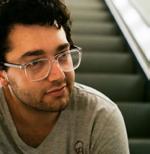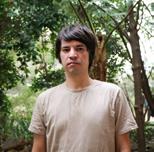Faculty of Science Awards

2023
Welcome
I am delighted to welcome you to the Faculty of Science Awards 2023.
The Awards are a key annual event on the Faculty calendar and I have been deeply impressed by the innovation and commitment of staff.
These Awards are a celebration of your collective achievements in research, teaching, education, and professional support services.
The Faculty of Science is a vibrant and dynamic learning community – made so by the passion and commitment of its staff and students.
There is much to be honoured and celebrated at today’s event and I look forward to sharing this important occasion with you.
Professor Jordan Nash Dean, Faculty of Science
Monash University recognises that its Australian campuses are located on the unceded lands of the people of the Kulin Nations, and pays its respects to their Elders, past and present.

2 | Faculty of Science Awards 2023
Research Awards
1. Research Excellence by an Early Career Researcher
This Award recognises research excellence by early career researchers who are within five years of the start of their research careers.
The Winner is: Dr Richard Jones, School of Earth, Atmosphere and Environment
The Nominees are:
Dr Cameron Bentley, School of Chemistry
Dr Cameron Bentley obtained his PhD from Monash University, Australia (2012 – 2015) and worked as a (Senior) Research Fellow at the University of Warwick, UK (2016 – 2020), supported by subsequent Endeavour (Australia), Marie Skłodowska-Curie (EU) and Ramsay Memorial (UK) Fellowships.


Currently, he is an ARC DECRA Fellow at Monash University and his research centres on combining cutting-edge electrochemical imaging techniques with co-located microscopy/spectroscopy to solve contemporary structure−function problems in electromaterials science. Cameron has published more than 60 peer-reviewed articles and is the recent recipient of the 2020 Early Career Analytical Electrochemistry Prize of ISE Division 1 (International Society of Electrochemistry, ISE) and 2023 AM Bond Medal (Electrochemistry Division of the Royal Australian Chemical Institute, EDRACI). He is also a Member of the Early Career Advisory Board of the peer-reviewed journal, ChemElectroChem (Wiley) and is a VIC State Representative on the committee of EDRACI.
Dr Foo Su Chern, School of Science, Malaysia
Dr Foo Su Chern is a leading expert in microalgae biotechnology. She graduated with the highest honours, having been awarded the Best PhD thesis from Universiti Putra Malaysia. During her time as an Erasmus scholar at Bournemouth University, she applied her research skills in microalgae biotechnology to the study of cyanobacteria ecology, strengthening her expertise in the field. As an ECR, Dr Foo envisions a continuous supply of bioactives sourced from microalgae biorefineries for a circular economy. To achieve this, she assembled a team of experts to work on microalgae photobioreactors for high value bioactives and effective carbon capture. Recently, her team discovered that Chlorella overproduces the carotenoid, lutein, at 10% CO2 concentration. Indeed, converting pollution to useful products underpins a closed loop biorefinery for a sustainable future. Dr Foo was awarded the Emerging Researcher Award in 2022 by MOHE and promotes sustainability through her role as a researcher and educator.

3
Dr Rebekah Duffin, School of Chemistry

Dr Rebekah (Bekka) Duffin completed her PhD at Monash University in 2019, with an emphasis on synthetic approaches and biological assessment of potential metal-based medicinal compounds. Her research and perseverance awarded her a prestigious place in the Periodic Table of Younger Chemists in 2018, a highly competitive internationally recognised award. With a total of 13 publications, 10 of which she is first or co-first author, over 150 citations and a h-index of 7, Bekka has demonstrated a passion for sharing her research with the wider scientific community. Having previously won the Faculty of Science award for scientific communication in 2019, Bekka has demonstrated her ability to present her research to the wider community. As lab head, Bekka continually demonstrates her approachability and mentoring skills to younger generations of scientists. She recently became a co-supervisor to her first official postgraduate student, and is keen to add to the number.
Dr Evgeni Grishi, School of Physics and Astronomy

Dr Grishin has completed PhD at the Technion in Israel in 2020. As a graduate student, Dr Grishin received numerous prizes and fellowships for research excellence and several prize postdoctoral fellowships overseas before accepting an offer from Monash. Dr Grishin is an outstanding theoretical astrophysicist working on many research areas, from planetary and stellar dynamics to black hole mergers. He has amassed an impeccable publications and citations track. Dr Grishin’s students are extremely productive and win prestigious research excellence fellowships. Dr Grishin also internationally recognised and given over 25 invited seminars and colloquia on his research worldwide.
Dr Richard Jones, School of Earth, Atmosphere and Environment
Dr Jones’ work seeks to understand the response of polar ice sheets, and corresponding sea level, to a changing climate. Using a unique combination of skills at the interface between discrete disciplines including geomorphology, geochemistry, data science and numerical modelling, his research has significantly advanced our understanding of ice sheet dynamics. Dr Jones received a national award for his PhD thesis and was granted postdoctoral research fellowships at Victoria University of Wellington (NZ), Durham University (UK), and recently an ARC DECRA fellowship at Monash. Dr Jones’ work has resulted in multiple high-impact publications, including in Nature, Nature Reviews, Nature Communications and Science Advances. His discoveries of processes that are pertinent to future ice sheet loss gained international media attention and were cited by the Intergovernmental Panel on Climate Change. Dr Jones is currently a Chief Investigator of an ARC Special Research Initiative, and ARC Linkage Infrastructure, Equipment and Facilities grant.

4 | Faculty of Science Awards 2023
Dr Karolina Matuszek, School of Chemistry

Dr Matuszek’s postdoctoral research began at Monash University in 2017 with Professor Doug MacFarlane. Her research focused on renewable energy storage technologies and phase change materials (PCMs). This topic attracted the attention of the Australian company Energy Storage P/L and was further funded by the Linkage Project. During her research career Dr Matuszek pioneered the use of ‘intermediate temperature’ phase change materials, with melting transitions between 100-220 °C that can be applied in the Carnot battery to store renewable energy. Her main research goal is to better understand molecular origins that govern high energy storage capacity in phase change materials and to ultimately design a material that can be used to store renewable energy at the large scale and domestic level. Dr Matuszek has published 38 peer-reviewed papers (H-index = 16) and 13 patents, including a paper in Science, Nature and an invited review article in Chemical Reviews.
Dr Matthew Snelson, School of Biological Sciences

Dr Matthew Snelson is an advanced Accredited Practicing Dietitian and National Heart Foundation Postdoctoral Fellow who commenced in the Hypertension Research Laboratory at Monash University in 2023. His current research focus is investigating the role of diet and intestinal permeability in hypertension. Prior to 2023, he worked at the Department of Diabetes, Monash University, where his research utilised cell culture, preclinical animal studies and diet intervention trials to elucidate the role of diet in altering diabetic kidney disease via modulation of the gut microbiota. He completed his PhD at Monash University in 2019. He has published 27 peer reviewed articles (15 as first/senior author), been awarded 14 national and five international awards, been an invited speaker at three international and five national meetings and given 11 international and 25 national presentations at 36 conferences. He is the president of the Australasian Human Microbiome Research Network.
Dr Gregory Walter, School of Biological Sciences
Dr Gregory Walter completed his PhD in 2016 at the University of Queensland where he examined how species rapidly diversify to inhabit contrasting environments. He then spent the next three years as a NERC research fellow with the University of Bristol studying how natural populations of Senecio wildflowers respond to environmental change on Mt Etna in Sicily. The focus of his research is using field experiments to test the potential for populations to persist and then adapt to novel environments, such as those created by climate change. He has published 19 articles in high quality journals and is currently a DECRA fellow at Monash University.

5
Dr Michelle Yap, School of Science, Malaysia
Dr Michelle Yap was awarded PhD (Molecular Medicine) in 2014 from the University of Malaya, Malaysia. She began her academic career as a Research Fellow in the same institution. She is currently a senior lecturer at the School of Science, Monash University Malaysia. Dr Yap’s research expertise focuses on toxin pharmacology. Her research aims to develop safe, effective, and affordable biotherapeutics to mitigate this global issue. She has experience in proteomics, immunological, and molecular pharmacology of bioactive toxins. She embraces active dissemination of research findings through publications and talks. She has published two book chapters, 28 research articles, and proceedings in WoS and Scopus-indexed journals. She also demonstrates research leadership acting as principal investigator in several external grants and leading an emerging topic as guest editor for Frontiers in Pharmacology.
Dr Lee Yee Ying, School of Science, Malaysia


Dr Lee Yee Ying’s research interest revolves around the fats and oils processing (a critical sector that drives Malaysia’s economy), primarily focusing on fabricating novel lipids via a sustainable approach for food application. As an early career researcher, Dr Lee has attained a strong track record of scientific publication (more than 60 peer articles and book chapters). She is widely known for her expertise in lipid modification, leading to the invited keynote speech in conferences and as a visiting scholar in Jinan University. She actively collaborates with national and international stakeholders in academia and industry in Malaysia, China, and Brunei. As a leader in her field, she successfully spearheaded her team to the publication of an edited book and the filing of a patent. Dr Lee is also currently leading a team of passionate young postgraduate researchers where several intramural and extramural large awards fund the research work.
Dr Zongzheng Zhou, School of Mathematics
Dr Zongzheng Zhou obtained his PhD in 2016 from Monash University. He was employed as a Research Fellow at the University of Melbourne in 2016 and then at Monash University, where he is currently employed as an Assistant Lecturer in School of Mathematics. His research interests are applied probability and statistical mechanics. He has published 17 research papers in high quality journals, and 1 preprint on arXiv. The recent work of Dr Zhou focuses on studying classical models in statistical mechanics on high-dimensional finite systems. Together with collaborators, he proposed the ‘random-length random walk’ model which serves as a toy model for understanding the finite-size behaviour of many fundamental models in statistical mechanics. Using this mode, Dr Zhou has resolved several long-standing debates in the fundamental theory of critical phenomena. This systematic work has led to nine publications in high-quality journals, including two in the top journal Physical Review Letters.

6 | Faculty of Science Awards 2023
2. Award for Research Engagement and Impact
This award recognises excellence by researchers who have achieved, or are currently achieving, outstanding economic and/or societal impacts.
The Winners are: Associate Professor Alexandr Simonov (School of Chemistry) and Associate Professor Carly Cook (School of Biological Sciences)
The Nominees are:
Associate Professor Carly Cook, School of Biological Sciences

Associate Professor Carly Cook’s research focuses on evidence-based conservation and developing decision support tools to help environmental managers integrate the best available science into conservation decisions. Throughout her career, Carly has worked closely with environmental managers to identify where decision-support tools could have the greatest impact. Her research has developed robust approaches to evaluate the design and management of protected areas, now used across Australia and internationally. She has revealed gaps in how environmental managers define conservation success and their failure to link monitoring data to management action. Developing tools that address these critical challenges, her research supports managers set clear criteria for success and determine when and how to act in response to negative outcomes. These tools are used by Australian and New Zealand governments and have been adopted by the International Union for the Conservation of Nature (IUCN) to identify global examples of best practice in protected areas.
Associate Professor Alexandr Simonov, School of Chemistry
Associate Professor Simonov is a current ARC Future Fellow specialising in electrochemistry and photo/electrocatalysis. He has been working at the Monash School of Chemistry since 2012 as a postdoctoral fellow (2012-2015), senior research fellow (2015-2018), lecturer (2018-2020), and senior lecturer (2021-present). His major research ambition is to design effective ways to generate and use renewable electricity for the sustainable energy and chemistry technologies that directly support the Monash Impact 2030 initiative and are of key strategic importance to Australia. Associate Professor Simonov is internationally renowned for his innovations in the development of methods for the generation of green hydrogen and ammonia from renewables, some of which are currently being translated into practical processes through collaborations with industry partners including Woodside Inc, Wesfarmers, Fortescue Future Industries and Energys P/L. In 2021, he co-founded, together with Professor Doug MacFarlane, a spin-out company Jupiter Ionics P/L to commercialise sustainable ammonia production technologies developed under their leadership.

7
Professor Adeline Su Yien Ting, School of Science, Malaysia
Professor Ting’s research is in applied microbiology. Her four grants by MOHE supported initial fundamental research studies which produced significant results for industry engagement. This led to partnership with the agroindustry through three industry grants which centred on new transformative ideas for oil palm research. Adeline focussed on bridging the knowledge gap in several key areas; the new role of suppressive soil to control oil palm disease (2018-2024), discovering new biomarkers via metabolomic studies for pathogen-plant-soil interactions (2021-2023), and in exploring the impact of microbial consortium on oil palm (2022-2028). These collaborations also integrate omics technology into an otherwise conventional field, to reveal greater insights of microbial-plant-soil interaction. New concepts are established that are aimed at transforming the conventional oil palm practices. This partnership has led to the training of one PhD student (staff from industry), one Post-Doctoral Researcher, and a total of three publications to date.

8 | Faculty of Science Awards 2023
Publication Award
This award recognises an outstanding and innovative research paper published by one or more researchers in the Faculty. The award is for a single article, monograph, or book consisting of original research, and published within the 10 calendar years preceding the year of the award.
The Winner is: Dr Hoang-Long Du, School of Chemistry
The Nominees are:
Dr Lesley Alton and Dr Vanessa Kellerman, School Biological Sciences
Alton LA, Kellermann V (2023) Interspecific interactions alter the metabolic costs of climate warming. Nature Climate Change 13, 382–388.

The energetic cost of living for cold-blooded, or ectothermic, animals is predicted to increase as the climate warms. This prediction is based solely on the physiological responses of ectotherms to changes in temperature. In their research paper, Dr Alton and Dr Kellermann demonstrate that purely physiological approaches to understanding the energetic cost of climate warming for ectotherms are insufficient because they ignore important ecological processes, such as interspecific interactions.
They found that when species interact at warmer temperatures, they become more active and expend more energy. By accounting for this effect of interspecific interactions on animal behaviour, they estimate that the energetic costs of climate warming for ectotherms will be 3–16% higher than previously thought. This research highlights that animal responses to temperature change should be studied under more ecologically realistic conditions to gain a more accurate appreciation for the impact of climate warming on

Professor Andrea Collevecchio, School of Mathematics

The Branching-Ruin Number and the Critical Parameter of Once-Reinforced Random Walk on Trees Collevecchio, A., Kious, D. & Sidoravicius, V., 2020, In: Communications on Pure and Applied Mathematics. 73, 1, p. 210-236 27 p.
This paper introduces a quantity that measures the growth of polynomial trees, called branching ruin number (BRN). It is proved that (BRN) of a tree is equal to the critical parameter for the behaviour of important class of random processes defined on these graphs, providing the complete picture of their phase transition. Roughly speaking, If the reinforcement parameter is large enough, compared to BRN, then the process will visit each vertex infinitely often. If the reinforcement is small enough, then the process drifts away.
3.
9
Dr Hoang-Long Du, School of Chemistry

The bibliographic information for the nominated publication: Du, H.-L., Chatti, M., Hodgetts, R.Y. et al. Electroreduction of nitrogen with almost 100% current-to-ammonia efficiency. Nature 609, 722–727 (2022). https://doi.org/10.1038/ s41586-022-05108-y
This publication is nominated based on its outstanding research on electrochemical nitrogen fixation, published in the prestigious journal Nature. The publication’s innovative approach to designing new functional materials has the potential to revolutionise the field and open new avenues for sustainable ammonia production. The merits of this innovation extend beyond environmental advantages to economic benefits for Australia as a leading producer and exporter of ammonia. The results reported in the article are of immense scientific and technological importance and represent a breakthrough in the field. Recognition of this publication through this award will bring greater visibility to our accomplishments and lead to new opportunities towards collaborations with research institutes and industry leaders worldwide. This recognition will enable us to continue to make significant contributions to the field and advance our research to accelerate the translation of this technology to practical devices.
Dr Hamdi Jama and Associate Professor Francine Marques, School of Biological Sciences

Jama, H.A., Rhys-Jones, D., Nakai, M. et al. Prebiotic intervention with HAMSAB in untreated essential hypertensive patients assessed in a phase II randomized trial. Nat Cardiovasc Res 2, 35–43 (2023). https://doi.org/10.1038/s44161-022-00197-4
There is a growing interest in the manipulating the gut microbiome as therapy for several diseases; however, most have only been demonstrated in animal models. In this proof-of-concept study, published in Nature Cardiovascular Research, we demonstrated we can use metabolites produced by the gut microbiome as a promising option for lowering blood pressure of patients with essential hypertension. The study showcases the efficacy of our novel delivery system, a dietary supplement called acetylated and butyrylated high amylose maize starch (HAMSAB), in delivering gut microbial-derived metabolites. This achievement is of utmost importance since high blood pressure, also known as hypertension, remains the single most modifiable risk factor for cardiovascular disease and all-cause mortality.accurate appreciation for the impact of climate warming on biodiversity.

10 | Faculty of Science Awards 2023
Professor Peter Skands, School of Physics and Astronomy

Title: A comprehensive guide to the physics and usage of PYTHIA 8.3
Authors: C. Bierlich, S. Chakraborty, N. Desai, L. Gellersen, I. Helenius, P. Ilten, L. Lönnblad, S. Mrenna, S. Prestel, C. Preuss, T. Sjöstrand, P. Skands, M. Utheim, R. Verheyen
Published in: SciPost Phys. Codebases 8 (2022)
Published on: 10 November 2022 DOI: 10.21468/SciPostPhysCodeb.8
This article describes a very substantial body of original research, carried out over several decades, that defines the leading global state of the art for addressing a wide range of fundamental questions in particle physics. E.g., it is the standard theoretical reference for the vast majority of measurements at the Large Hadron Collider, and for the field in general. During its first year since publication, it has already had exceptional impact, with over 150 inSPIRE citations. This number is expected to grow to about 1,000 citations per year as this paper replaces previous brief summaries that are now obsolete, a combined impact which is the highest in the field. As a decades-long author and current leader (spokesperson) for the PYTHIA Collaboration, Professor Skands’ original research has contributed to and shaped almost all aspects of PYTHIA. The paper also includes a highly detailed schematic produced by Prof Skands that was voted the best Physics Plot of 2022 in a highly competitive online poll. to the field and advance our research to accelerate the translation of this technology to practical devices.
Dr Lee Yee Ying, School of Science, Malaysia

Lee, Yee Ying*, Tang, Teck Kim, Chan, Eng Seng, Phuah, Eng Tong, Lai, Oi Ming, Tan, Chin Pin, Wang, Yong, Ab Karim, Nur Azwani, Mat Dian, Noorlida Habi & Tan, Joo Shun (2022), “’Medium Chain Triglyceride and Medium-and Long Chain Triglyceride: Metabolism, Production, Health Impacts and its Applications – A Review,’ in Critical Review of Food Science and Nutrition” , vol. 62, no. 15, pp. 4169-4185. https://doi.org/10.1080/10408398.2021.1873729
* first and corresponding author
This paper brings together fats and oils experts to critically analyse the work of healthy lipid -- ‘Medium Chain Triglyceride and Medium-and Long Chain Triglyceride’ (MLCT) and Medium Chain Triglyceride (MCT) – catering to a broader audience including food, pharmacology and medicine, by covering the overview of MLCT & MCT including metabolism, production, health impacts, its applications. Critical Review of Food Science and Nutrition is a Top 10% journal that stands amongst the best in the food science and technology field with a rank of 3 over 89 in nutrition and dietetics and 4 over 139 in the area of Food Science and Technology and an impact factor of 11.656. As the leading paper in the field, it attained a citation of greater than 30 within a year of publication, book chapter publication, industry collaborative work, and media attention.
11
4. Award for Research Community
This award is designed to reward excellence by individual researchers, research professionals, and/or research teams whose contributions through service, mentorship, leadership, and involvement in the university, or in their discipline, or beyond has enabled research excellence and research impact, at a broader scale than an individual contribution.
The Nominees are:
Associate Professor Francine Marques, School of Biological Sciences


Associate Professor Francine Marques has dedicated a significant amount of time improving the culture of the research community at local, national and international levels. Key examples include: i) local and national workshops on establishing our individualised professional mission and living through our values; ii) the establishment of a national cross-sector mentoring program and an international podcast about mentoring with 45 episodes to date and listeners in more than 90 countries; and iii) original research about the current research culture in Australia which led to the development of an international roadmap to remove current barriers to diversity and equity with global impact.
Dr Mark Flegg, Associate Professor Anja Slim, Professor Andreas Ernst, School of Mathematics

The nominees hosted the Mathematics in Industry Study Group (MISG). The event was fully funded by partners: Costa Group, Sun Cable, Australian Energy Market Commission (AEMC) and NSW Health. Partners contributed their time and data with the goal of solving emerging problems using mathematics. The nominees attracted over 100 mathematicians from every Australian state (ex. Tasmania), NZ, UK and Japan for the week of MISG and managed the communication of results to stakeholders.
The impact was significant and included optimising CO2 management to grow tomatoes for Costa Group; for Sun Cable, recommending mathematically-optimised designs of subsea cables linking Australia and Singapore; formulating a framework to analyse risk associated with renewable energy for the AEMC which now underpins the recommendations for national energy market regulation and providing methods for optimising surgical schedules and resources for NSW Health who have now committed to including mathematicians in their research teams.
The Winner is: Associate Professor Francine Marques, School of Biological Sciences
12 | Faculty of Science Awards 2023
Professor Qasim Ayub, Dr Wee Wei Yee, Ms Lim Shu Yong, Dr Cheah Hong Leong and Ms Ling Fong Yoke, School of Science, Malaysia

Monash University Malaysia
Genomic Facility (MUMGF) is an ISO 9001 certified Monash Technology Research Platform that provides nucleic acid sequencing and bioinformatics services. It generates sequencing data for a wide range of organisms, thus, supporting diverse fields of study and cross-campus based multidisciplinary research. It has processed thousands of samples in the past five years for industrial and academic users and made significant contributions in the strategic areas of Climate Change and Thriving Communities by conducting research projects in conservation, population and human disease genomics. The team has published 53 papers in the past five years including high-impact publications in Nature, and Science. MUMGF also supports students in their research and facilitates the teaching of bioinformatics. In partnership with the world-renowned Wellcome Sanger Institute, Hinxton, it has hosted five workshops since 2018 that have provided training in bioinformatics to researchers across the Asia Pacific region.
13
Education Awards
5. Dean’s Excellence in Teaching Award
This Award recognises and celebrates outstanding contributions to the Faculty of Science teaching programs made by individuals or teams. Awardees have demonstrated outstanding approaches to teaching and/or the support of learning that influences, motivates and inspires students, excellent development of curricula, resources or services reflecting a command of the field, high-quality evaluation of practises that lead to improvements in teaching and learning, and influential innovation, leadership or scholarship that shifts the dial on teaching, learning or the student experience.
The Winners are:
Individual category: Professor Peter Skands, School of Physics and Astronomy
Professor Skands fosters a supportive and collaborative classroom atmosphere that encourages students to share their thoughts and ideas, and to actively participate in their own learning. In 4 years, PHS3302 Relativity and Particle Physics has been raised to the highest international level while maintaining very high SETU scores, pioneering new pedagogical methods and technologies, incorporating new feedback and evaluation mechanisms, and changing the delivery to follow modern evidence-based recommendations.
Commendation: Dr Istvan Laszlo, School of Physics and Astronomy


Based on educational research, Dr Laszlo facilitated the transition to Studio Learning, created many new resources, activities, and assessments which provide automatic tailored feedback, hints, and marking, and developed a uniquely successful coding program interwoven into second year physics. These innovations have been successful and are frequently praised in SETU.

14 | Faculty of Science Awards 2023
Team category: Dr Drasko Vidovic, Professor Louise Bennett, Professor Perran Cook, Maria Triantis, TzeKih Tsai, School of Chemistry

CHM2962 Food Chemistry is an important unit both as part of a chemistry major and as an elective in other science majors or other degree programs. All aspects of the unit were revised and improved for 2022 with input from everyone involved in the unit, including the unit coordinator and lecture team, lab professional staff and the School of Chemistry’s education designer. This ‘whole of unit’ approach has yielded a dramatic turnaround in SETU scores and student engagement and satisfaction. The team continues to seek areas for improvement and the unit is well-placed to become a key unit for the School and Faculty.
6. Dean’s Award for Innovation in Learning and Teaching
This Award recognises outstanding innovation driven by technologies or curriculum which improves student engagement, teaching, learning or assessment. Nomination is open to all academic staff, professional staff and teaching associates of the Faculty of Science. Awardees have demonstrated outstanding approaches to teaching and learning through curriculum or technological innovation, development of curricular, resources or services, evaluation practices that bring positive change and inflential innovation, leadership, or scholarship that shifts the dial on teaching, learning or the student experience.
The Winner is: Associate Professor Mike McDonald, School of Biological Sciences
Associate Professor Mike McDonald, School of Biological Sciences

Associate Professor McDonald incorporated cutting-edge laboratory automation and genomic technologies into the Master of Genome Analytics GNA5022 Sequencing Technologies curriculum. This hands-on approach has increased student engagement, improved problemsolving skills, and led to positive feedback, reflecting his commitment to enhancing teaching and learning experiences.

15
7. Dean’s Citation for Outstanding Contribution to Student Learning


This Award recognises and celebrates outstanding contributions to the Faculty of Science teaching programs made by early career academics or professional staff, as individuals or teams.
Dr Foo Su Chern, School of Science, Malaysia
Dr. Foo has developed immersive resources for the School of Science, applying the experiential learning principle to support students to be critical thinkers and collaborative problem-solvers. Positive student responses, collegial recognition, a Silver award for T&L competition, and a published paper in 2022 are some outcomes of this approach.
8. Dean’s Award for Excellence in Honours Supervision
This Award recognises supervisors who have undertaken exceptional and unique supervision practices to benefit and enrich the experiences of their Honours students.
Dr Ken Yeong Keng Yoon, School of Science, Malaysia
Dr Yeong has graduated 11 Honours students since 2018, with another 5 are expected to graduate this year. The great majority of his students obtained First Class Honours and seven also published their research. This success demonstrated the quality of his supervision and mentorship that is focused on developing honours students into independent and resourceful researchers.

 The Winner is: Dr Foo Su Chern, School of Science, Malaysia
The Winner is: Dr Foo Su Chern, School of Science, Malaysia
16 | Faculty of Science Awards 2023
The Winner is: Dr Ken Yeong Keng Yoon, School of Science, Malaysia
Commendation: Dr Tan Ji Wei, School of Science, Malaysia
Since joining Monash University Malaysia in 2018, Dr Tan has been supervising one of the largest cohorts of Honours students at the School of Science. Through effective supervision and discussions, his supervised Honours students become independent thinkers and innovators, leading to well-performed research and outstanding recognition.

17
9. Dean’s Student Impact Awards
These awards recognise students for efforts beyond academic achievement by contributing to supporting their fellow students.
• The Academic Culture Award recognises a student’s special efforts to create programs to support fellow students academically or collaborate with staff to improve/design curriculum assessment.
Winners: Students in the Master of Genome Analytics
The Master of Genome Analytics student representative committee has vastly influenced and improved the academic culture for the students in this course. They have collaborated with staff by providing feedback, suggestions and ideas for the curriculum and assessment of units, leading to an enriched experience for staff and students alike.
y Julie Robin
y Caleb Cartagena
y Luke Tork
y Elaine Zhang
y Tiare Chang
y Chris Ciotta
Commendation: Ida Gaulke, School of Biological Sciences
Undergraduate student Ida has been involved in several positions contributing to improving student experience and the structure of undergraduate learning and teaching at Monash University including as the Undergraduate Representative on the Biological Sciences Education Committee, a Peer Mentor to first-year students, and an Open Day Ambassador.
• The Master Impact Award recognises outstanding graduate students who have demonstrated impact in their disciplinary field of environment and sustainability, mathematics, financial mathematics, earth science, physics, astrophysics, or atmospheric science. The student’s impact may be in research or for impact on society, through positive outcomes led by the student to advance an issue relating to the community, a social good program, a NPO/NGO, industry or government.
Winners: Students in the Master of Environment and Sustainability
18 | Faculty of Science Awards 2023
The Un-Earthed Podcast was created by students in the Master of Environment and Sustainability to combine their love for science and podcasts. Inspired by the rise of online podcasting, they set on a journey to expand their own knowledge on sustainability and explore diverse and relevant topics with experts to inform and educate other students and wider society.
y Callum Harry Plymin
y Charlotte Mills
y Monica Coleman
y Matthieu Hortense
y Lara Salaysay
y Krishna C. Suri
y Gursaya Grewal
• The Science Communication Award: Students may self-nominate, or be nominated by another student or staff member, around the broad category of science communication. This may include: cultivating a science-based blog, impactful micro-blogging or social media science profile, vodcast (e.g. YouTube/ Vimeo), podcasts, or other website activities with broad readership/engagement, developing science communication workshops, events, resources, and or communities of practice or any other form of relevant science communication.
Winner: Ida Gaulke, School of Biological Sciences
Ida has held the position of Editor for the Friends of Wilson Botanic Park, Berwick for numerous years and produces a quarterly newsletter promoting events and activities at the park, as well as articles focused on raising awareness for broader environmental topics. In this role she is able to share knowledge from her science degree at Monash and ensure that the information is understandable to a wide range of audiences.
19
10. Dean’s Honours List
This award celebrates the achievements of our top students. The Awardees are:
• Anthony James Pisani
• Chelsea Ruth Scott-Hayward
• Emily Anita Palit
• Emma Tara Nemoto Mcquire
• Jared Ali Abidi
• Jessica Grace Bennetts
• Joshua Nung
• Lachlan Andrew Steele
• Luca Petterlin
• Mason Chuen-Lai Lam
• Michael Gitonobel
• Nicholas William Carpenter
• Preet Jignesh Patel
• Pu Ti Dai
• Rachel May Mccready
• Raymond Maoyuan Li
• Sarah Xin Hua He
• Tori Lindner Guarnera
• Wan Lin Chin
• William John Devlin
• Yixu Wang
20 | Faculty of Science Awards 2023
Graduate Research Awards

11. Excellence in Postgraduate Research Supervision
This Award recognises research supervisors who have undertaken exceptional and unique supervision practices to benefit and enrich the experiences of their graduate research students.
The Winners are: Professor Bob Wong, School of Biological Sciences and Dr Joash Tan Ban Lee, School of Science, Malaysia
Professor Bob Wong, School of Biological Sciences


Professor Bob Wong is a world-leading authority on wildlife behavioural responses to environmental change. Since joining Monash in 2006, he has supervised 36 PhD students and 44 Honours students. His award-winning supervision style focuses on mentoring, coaching, and empowering students to develop into confident, independent thinkers who are proficient at driving scientific inquiry and communicating research to the scientific community and beyond. As evidence of impact, in the last five years alone, his students have achieved 55 papers in top-ranking international journals, delivered more than 50 talks or posters at national and international conferences, attracted over $70,000 in external grants, and received numerous prestigious national and international awards, including the 2018 Society of Environmental Toxicology and Chemistry Europe Young Scientist Award and the 2021 Society of Environmental Toxicology and Chemistry Australasia Early Career Medal. After graduating Professor Wong’s students have enjoyed excellent employment outcomes in science-related fields around the world.
Dr Joash Tan Ban Lee, School of Science, Malaysia
Dr Joash Tan has supervised 13 and co-supervised ten postgraduates, with nine concurrent postgraduates as PI during the pandemic. Eleven have since graduated, with several obtaining positions in noteworthy institutions such as Nanyang Technological University Singapore. His students have won numerous awards and recognitions, including Best Postgraduate, numerous best presenter awards at conferences, and several grants, including travel grants and external research funding (e.g. from the Malaysian Toray Science Foundation). Their publications have also been of exceptional quality, with all of the 2022 and 2023 journal publications being in top 10% journals, and a new patent filed that will be showcased at the 34th International Invention, Innovation, & Technology Exhibition 2023. To accomplish this, he is contactable 24/7 for discussion and troubleshooting, with weekly research meetings, fast turnaround times and critical evaluation of student work.
21
12. Award for Outstanding Contributions by a Graduate Research Student to the Life of the Faculty/School Community
This Award celebrates outstanding contribution/s to the life of the Faculty of Science/School community, by individuals or teams of graduate research students within the Faculty of Science, that are above and beyond their own research and the expectations of a postgraduate student.
The Winner is: Daniel Van Zeil, School of Chemistry
The Nominees are:
Daniel Van Zeil, School of Chemistry

Daniel Van Zeil is a third year PhD student in the Simonov research group developing novel catalysts and support materials for the electrochemical splitting of water. Daniel has been a community leader of the School of Chemistry since 2020 due to his involvement in the Chemistry Honours and Miscellaneous Postgraduate Society (CHAMPS), including his time as President (2022-2023). During this time Daniel coordinated many events, including BBQs, board game nights, morning teas and trivia night. In addition to this work he is always willing to help other members of his research group and the wider community within the school, and has volunteered his time during O-week to help with demonstrations to prospective students.
Sam Cohen, School of Chemistry

Sam Cohen is a final year PhD student who is passionate about supporting mental health and personal wellbeing amongst his colleagues. He has always gone above and beyond expectations when it comes to assisting coworkers, continually offering help where possible and taking on added responsibilities with a smile. He is continually looking for ways to add to the working environment within the group, and provide a positive experience for any who engage with the research.
Vivian Wong Li Wen, School of Science, Malaysia

Vivian is completing a PhD under the supervision of Dr. Joash Tan Ban Lee. Her current research focuses on developing and characterising injectable nanocomposite hydrogels for various tissue engineering applications. She has developed this novel nanocomposite to replace the current surgical treatment for injuries. The novel formulations and their characteristics were filed in the Malaysian IP Office in 2022. The obtained findings have all been published in Q1 journals; mostly top 10% (and even top 2%) journals. Vivian has also received three grants including High Impact Research Support Fund, MTSF’s Year 2022 Science & Technology Research Grant, and Tropical Medicine and the Biology
Multidisciplinary Platform Grant. She was awarded the Best Oral and Poster Presenter in the Monash Science Symposium (MSS) 2022 and the 2nd International Symposium on Advanced Materials. She was also the Head of Logistics for the MSS2021 from September 2019 to March 2021.
22 | Faculty of Science Awards 2023
13. Norris Family Award for Outstanding Author Contribution by a Graduate Research Student to a published ‘Quality’ Scholarly Research Output
This award recognises an outstanding contribution by a graduate research student to the authorship of a quality scholarly research output (ie. Book, Book Chapter, Journal Article, Conference proceeding.)
The Winners are: Thiago De Paiva Souza, School of Mathematics and Vivian Wong Li Wen, School of Science, Malaysia
The Nominees are:
Thiago De Paiva Souza, School of Mathematics

Thiago de Paiva Souza is a PhD student in Topology who began his PhD at Monash in March 2020. Thiago rapidly became an expert on the geometry of certain knots that arise in dynamics. By December 2020 he had written the nominated paper and posted it on the ArXiv. The paper was entirely his own work. It answered a question posed in 2013 on the nature of surfaces lying around these dynamical knots. The paper was accepted for publication in the Q1 journal Algebraic & Geometric Topology in October 2021, with very strong referee reports, and published in 2022. In fact, this is the first of eight papers that Thiago has written during his PhD so far, including five other solo-authored papers. Six of his papers have already been published, and two are under review. This is impressive for any PhD student, but particularly notable in pure mathematics.
Vivian Wong Li Wen, School of Science, Malaysia

Vivian’s current research interest focuses on developing and characterising injectable halloysite nanotubereinforced nanocomposite hydrogels for various tissue engineering applications. She has developed a novel nanocomposite hydrogel to replace the current surgical treatment for injuries. The novel formulations and their characteristics were filed in the Malaysian IP Office (MyIPO) on 20 July 2022. The obtained findings have been published in Applied Clay Science, to provide insight and better understanding to the scientific community for developing alternatives to treat injuries and enhance wound recovery. Vivian has also studied various potentials of the nanocomposite hydrogels, and the team intends to improve the formulation for commercial purposes.
Thulya Chakkumpulakkal Puthan Veettil, School of Chemistry
Thulya is pursuing a PhD degree in analytical chemistry from the Monash/Bath global PhD programme under the guidance of Professor Bayden Wood and Dr Paul De Bank. She is working towards the development of novel rapid and robust vibrational spectroscopic modalities for point-of-care (P.O.C) applications for infectious diseases such as Malaria, Leishmaniasis, and sepsis. Her work has been acknowledged on several occasions. She has published nine articles in internationally reputed journals and three articles are currently under review. Thulya has been awarded the 2021 Australian Institute of Nuclear Science and Engineering Postgraduate Research Award (AINSE-PGRA), the AINSE technical skills scholarship, the ABS trust’s student bursary award, and a research development grant from Royal Society of Chemistry.

23
Manjiri Choudhari, School of Chemistry
Manjiri completed an integrated Master’s degree in chemistry from the Indian Institute of Technology, Kharagpur, in 2017 and subsequently joined the group of Dr Chris Ritchie as a PhD student in 2019. Manjiri has conducted outstanding research throughout her PhD while showing enthusiasm along the way. The findings made throughout her PhD are of significance to the international chemistry community and will be communicated with urgency in leading international general chemistry journals. She has developed a new class of structurally and compositionally unique photochromic ligands and molecular hybrids that have been studied in conjunction with physicists and analytical chemists. One of many findings is already published in a top-quality journal Chemical Science

George Jarvis, School of Biological Sciences
George is interested in the evolution of life-history strategies. He uses comparative analyses to investigate the causes and consequences of key traits like body size, hermaphroditism, and metabolism across the tree of life. In his recent paper, ‘Macroevolutionary patterns in marine hermaphroditism’, George and his supervisors tested whether the well-established theoretical drivers of hermaphroditism in plants also apply to animals. They examined 1,100 species of marine invertebrates from three phyla and found that species with internal fertilisation, restricted offspring dispersal, or small body sizes are more likely to be hermaphroditic than those with external fertilisation, planktonic development, or larger body sizes. Their findings support long-standing but previously poorly-tested theories in animal hermaphroditism and represent an important contribution to the fields of evolutionary biology and sexual selection. Moreover, the approaches used in this study can easily be applied to explain evolutionary drivers in other taxa and life-history traits.

24 | Faculty of Science Awards 2023
Mollie Holman Doctoral Medal for Science
The Mollie Holman Medal was established in 1998 and is named after the late pioneering physiologist, Emeritus Professor Mollie Holman AO, in honour of her significant contributions to science and education. Each year, a maximum of 10 medals are awarded to doctoral students, who have fulfilled their degree requirements and presented their faculty’s best thesis of the year.
The Winner is: Dr Mark Louis Vidallon, School of Chemistry
Mark earned his BSc in Chemistry from the University of the Philippines Los Baños (UPLB) in May 2022. Prior to joining the Soft Materials and Colloids Lab at Monash University as a PhD student in January 2018, he dedicated three years to teaching general and organic chemistry laboratory courses at UPLB. Under the joint supervision of Dr. Boon Mian Teo, A/Prof. Rico F. Tabor, and Dr. Alexis Bishop, Mark conducted colloid research, focusing on the development of innovative gas-containing and gas-generating materials. These colloids, based on red blood cell membranes and bioinspired polydopamine, were designed for ultrasound and photoacoustic imaging, drug delivery, and theranostic applications. His specialisation lies in the fabrication and physicochemical characterisation of these multistimuli-responsive and unstable colloidal materials, utilising state-of-theart instrumentations. In March 2022, Mark successfully completed his doctorate degree, and he currently holds a Research Officer position in the Molecular Imaging and Theranostics Laboratory at the Baker Heart and Diabetes Institute.

15. Vice-Chancellor’s Commendation for Thesis Excellence
The Vice-Chancellor’s Commendation for Thesis Excellence was established to recognise and reward outstanding doctoral and research master’s thesis excellence. Each year, a maximum of five commendations are awarded to doctoral and/or research masters students, who have fulfilled their degree requirements and have presented as outstanding contributors to research by their faculty.
Dr Hamdi Jama is a dedicated postdoctoral researcher in the Hypertension Research Laboratory at the School of Biological Sciences, focusing on the influence of dietary fibre on the gut microbiome and its implications for cardiovascular diseases (CVD). She completed her PhD in 2022 under the supervision of A/Prof Francine Marques and Prof David Kaye, publishing 14 peer-reviewed papers. Notably, Dr Jama published a ground-breaking clinical trial using a dietary fibre supplement to treat hypertension in humans, revealing the crucial role of the gut microbiome in regulating the production of short-chain fatty acids and its profound impact on blood pressure regulation. These findings have significant implications for the management and treatment of CVD. In addition to her research, Dr Jama actively contributes to various professional societies, including serving as the program manager for Hypertension Australia’s Annual Scientific Meeting. She is also actively involved in mentorship and advancement programs for early career researchers, participating in the International Society of Hypertension Mentorship and Training Committee and the Early Career Researcher’s Committee of Hypertension Australia. Dr Jama fosters collaborative efforts within the scientific community by engaging with the Australasian Human Microbiome Research Network Working Group.

14.
25
The Winner is: Dr Hamdi Jama, School Biological Sciences
16. Award for Research Impact by a Graduate Research Student
This award recognises research by a graduate research student that is creating real-world impact in sectors and society beyond academia.
The Winner is: Victoria Florence Sperring, School of Biological Sciences
The Nominees are:
Victoria Florence Sperring, School of Biological Sciences
Florence (Flossy) is a PhD candidate within the School of Biological Sciences. Throughout her candidature, she has worked closely with land managers on Norfolk Island to ensure a direct link between research and management outcomes. Her research has contributed to the conservation of the critically endangered Norfolk Island morepork through an investigation into key threats and management solutions. Flossy has also led community forums and surveys to ensure the voice of the community is heard regarding management decisions. She is the lead author on the Norfolk Island morepork Action Plan (a book chapter) that serves to guide conservation actions for the next decade and has attended workshops to further conservation outcomes on Norfolk Island as an ecologist with expertise on morepork conservation.

Vivian Wong Li Wen, School of Science, Malaysia
Vivian is pursuing her PhD in the School of Science, Monash University Malaysia, under the supervision of Dr Joash Tan Ban Lee. Vivian and her supervisor, Dr Joash have developed a novel injectable nanocomposite hydrogel to replace the current surgical treatment for injuries. The novel formulations and their characteristics were filed in the Malaysian IP Office in 2022. The obtained findings have all been published in Q1 journals; mostly top 10% (and even top 2%) journals. Vivian has also received three grants for the development of this invention, including High Impact Research Support Fund, MTSF’s 2022 Science & Technology Research Grant and theTropical Medicine and Biology Multidisciplinary Platform Grant. She has also presented the findings of the invention and was awarded for Best Oral and Poster Presentations. Vivian continues to study various potential applications of the nanocomposite hydrogels, and the team intends to further improve the formulation for commercial purposes.

26 | Faculty of Science Awards 2023
17. Dean’s Award for Equity, Diversity and Inclusion
This award recognises and celebrates outstanding contributions to the Faculty of Science to programs promoting equity, diversity and inclusion made by individuals or teams.
The Winner is: Dr Victoria Blair, School of Chemistry
Together with the Equity, Diversity and Inclusion (EDI) Committee Dr Blair has been instrumental in driving the roll out of the ‘Period Positivity’ campaign at Monash. This program provides free sanitary products on campus to improve equity and remove the stigma around periods.

27
monash.edu/science
Monash Science on Twitter: @Monash_Science
Monash Science on Instagram: @monash_science
Monash Science Facebook: @ScienceatMonash
Monash Science on LinkedIn: Monash Science
Monash Science on TikTok: @monash_science
Monash Science YouTube: youtube.com/ScienceMonashUni
Produced by the Faculty of Science Marketing, Media and Communications Office.
Authorised by the Faculty of Science General Manager July, 2023
The information in this brochure was correct at the time of publication. Monash Faculty of Science reserves the right to alter this information should the need arise.
CRICOS Provider: Monash 00008C



































 The Winner is: Dr Foo Su Chern, School of Science, Malaysia
The Winner is: Dr Foo Su Chern, School of Science, Malaysia
















